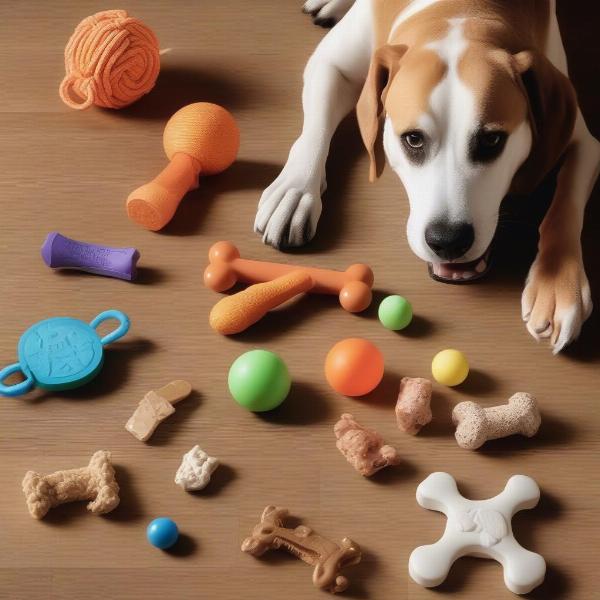Chewing is a natural behavior for dogs, but when that chewing is directed at their bed, it can be frustrating and expensive. If you’re constantly replacing dog beds, you’re not alone. This comprehensive guide will explore why dogs chew their beds and provide practical, actionable solutions to help you stop this destructive habit. We’ll cover everything from managing anxiety to providing appropriate chew toys and creating a positive environment. Let’s get started on saving your dog’s bed (and your sanity)!
Understanding Why Your Dog Chews Their Bed
Before you can address the chewing, you need to understand the root cause. Several factors can contribute to this behavior:
- Teething Puppies: Young puppies experience discomfort as their adult teeth emerge. Chewing helps relieve this pain and pressure.
- Boredom and Lack of Stimulation: A dog left alone for long periods with little to do can become bored and turn to destructive behaviors like bed chewing.
- Anxiety or Stress: Separation anxiety, loud noises, or changes in routine can trigger anxiety, leading to destructive chewing as a coping mechanism.
- Medical Conditions: Certain medical conditions, such as dental problems or nutritional deficiencies, can also cause increased chewing.
- Breed-Specific Behaviors: Some breeds are naturally more prone to chewing than others.
Effective Strategies to Stop Bed Chewing
Now that we understand the potential reasons, let’s delve into the solutions. Here are some proven strategies to help stop your dog from chewing their bed:
Provide Appropriate Chew Toys
Offer a variety of engaging chew toys to redirect your dog’s chewing instincts. Choose toys made of durable materials, like rubber or nylon, that can withstand vigorous chewing.
- Textured Toys: Toys with different textures can be stimulating and satisfying for chewers.
- Flavorful Toys: Toys infused with flavors, like beef or chicken, can entice your dog and keep them occupied.
- Puzzle Toys: Puzzle toys that dispense treats can provide mental stimulation and keep your dog engaged.
 Dog playing with different chew toys
Dog playing with different chew toys
Manage Anxiety and Stress
If anxiety is the culprit, addressing the underlying cause is crucial.
- Create a Safe Space: Provide a comfortable and secure den-like area where your dog can retreat when feeling anxious. This could be a crate, a dog bed in a quiet corner, or even a covered dog bed oval cushion. dog bed oval cushion
- Desensitization and Counterconditioning: Gradually expose your dog to anxiety-inducing stimuli, like being left alone, while pairing it with positive experiences, like treats or praise.
- Consult a Veterinarian or Behaviorist: For severe anxiety, consider seeking professional help from a veterinarian or certified dog behaviorist. They can help determine the best course of action, which may include medication or specialized training techniques.
Increase Exercise and Mental Stimulation
A tired dog is less likely to chew destructively.
- Regular Walks and Playtime: Ensure your dog gets plenty of physical exercise through daily walks, runs, or playtime in the park. how to strengthen dogs back legs
- Mental Enrichment: Provide mental stimulation through training, puzzle toys, and interactive games. This can help alleviate boredom and prevent destructive behaviors.
Make the Bed Less Appealing
Deterrents can help make the bed less appealing to chew.
- Bitter Apple Spray: Spray the bed with a bitter apple spray, which has a taste dogs dislike.
- Cover the Bed: Use a washable cover or blanket to protect the bed from chewing.
Conclusion
Stopping your dog from chewing their bed requires patience, consistency, and a multi-faceted approach. By understanding the underlying cause and implementing these strategies, you can help your dog break this destructive habit and enjoy a comfortable, chew-free sleeping space. Remember, addressing the root cause, whether it’s anxiety, boredom, or teething, is key to long-term success. Don’t give up! With a little effort and understanding, you and your furry friend can conquer this challenge together.
FAQ
- My puppy is teething. What can I give them to chew on? Offer puppy-safe chew toys made of soft rubber or silicone. Frozen carrots or teething toys can also soothe sore gums.
- Is it okay to scold my dog for chewing their bed? Scolding is rarely effective and can worsen anxiety. Focus on positive reinforcement and redirection.
- My dog only chews their bed when I’m gone. What can I do? This likely indicates separation anxiety. Consult with a veterinarian or behaviorist for guidance.
- What if none of these strategies work? Consider consulting with a professional dog trainer or behaviorist who can provide personalized advice and support.
- Can I use essential oils to deter chewing? Many essential oils are toxic to dogs. Stick to dog-safe deterrents like bitter apple spray.
- How can I make my dog’s bed more comfortable? Consider different bed fillings and materials, or try a dog bed oval cushion. dog bed oval cushion
- What are signs of a medical condition causing chewing? Excessive drooling, pawing at the mouth, or changes in appetite can indicate underlying medical issues. Consult your veterinarian.
ILM Dog is your trusted source for comprehensive dog care information, expert advice, and a curated selection of products to enhance your dog’s health and well-being. Whether you’re seeking guidance on breed selection, health care, training, nutrition, grooming, or accessories, our experts are dedicated to providing practical, evidence-based solutions for every stage of your dog’s life. Contact us today for personalized support: Email: [email protected], Phone: +44 20-3965-8624. Visit ILM Dog for more valuable resources and premium products to nurture your canine companion.